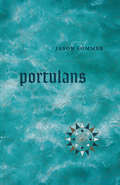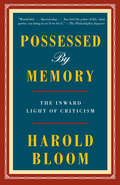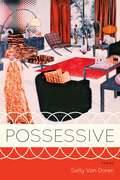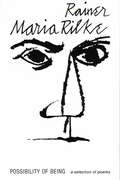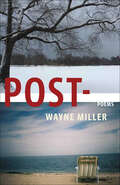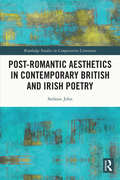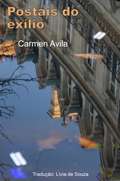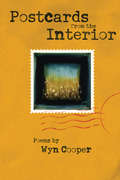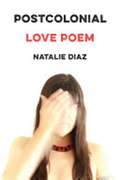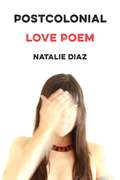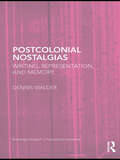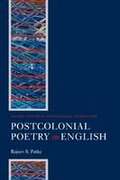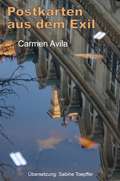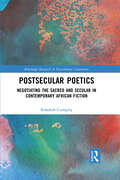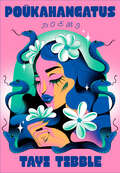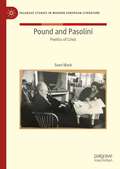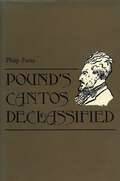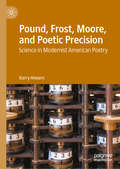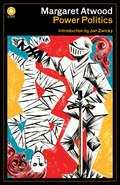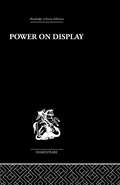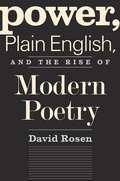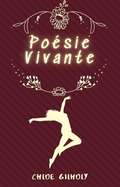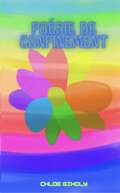- Table View
- List View
Portulans (Phoenix Poets)
by Jason SommerTaking inspiration from medieval sea charts—portulans—the poems in Jason Sommer’s collection bring a fresh variation to the ancient metaphor of life as a journey. Creating a coordinate system charting paths between ports and the dangers that surrounded them, portulans offered webs of routes and images through which sailors could navigate. These maps—both accurate and beautifully illustrated—guided mariners from port to port weaving paths at the threshold of the open sea. Similarly, the course of these poems navigates familiar mysteries and perennial questions through times of unbelief, asking whether consciousness is anchored in the transcendent, if inward travel can descend past the self, and if the universe can be accounted for by physics alone. Is there more to the story that you remember and hesitate to say? Your eyes, though, scanning upward in their sockets, do seem to search memory, but for what may be gone already, gone to where it goes—wherever it came from—gone as can be imagined, down into things, in past flesh and bark, marrow and pith, and down, down into molecule, atom, particle, vanishing into theory. Through this collection, Sommer takes us to the ocean floor, into the basement, out the front door, through multiverses, and in and out of dreams. Along the way, he considers whether art—the beauty of the map—can provide momentary meaning against a backdrop of oblivion. Drawing on history and myth, the voices in these poems consider what can and cannot be known of the self and the other, of our values, and of what we insist has permanence. These are poems of searching. Like ancient cartographers who lent lavish decoration to their maps, the poems in Portulans illuminate possibilities of beauty in each journey.
Portulans (Phoenix Poets)
by Jason SommerTaking inspiration from medieval sea charts—portulans—the poems in Jason Sommer’s collection bring a fresh variation to the ancient metaphor of life as a journey. Creating a coordinate system charting paths between ports and the dangers that surrounded them, portulans offered webs of routes and images through which sailors could navigate. These maps—both accurate and beautifully illustrated—guided mariners from port to port weaving paths at the threshold of the open sea. Similarly, the course of these poems navigates familiar mysteries and perennial questions through times of unbelief, asking whether consciousness is anchored in the transcendent, if inward travel can descend past the self, and if the universe can be accounted for by physics alone. Is there more to the story that you remember and hesitate to say? Your eyes, though, scanning upward in their sockets, do seem to search memory, but for what may be gone already, gone to where it goes—wherever it came from—gone as can be imagined, down into things, in past flesh and bark, marrow and pith, and down, down into molecule, atom, particle, vanishing into theory. Through this collection, Sommer takes us to the ocean floor, into the basement, out the front door, through multiverses, and in and out of dreams. Along the way, he considers whether art—the beauty of the map—can provide momentary meaning against a backdrop of oblivion. Drawing on history and myth, the voices in these poems consider what can and cannot be known of the self and the other, of our values, and of what we insist has permanence. These are poems of searching. Like ancient cartographers who lent lavish decoration to their maps, the poems in Portulans illuminate possibilities of beauty in each journey.
Possessed by Memory: The Inward Light of Criticism
by Harold BloomIn arguably his most personal and lasting book, America's most daringly original and controversial critic gives us brief, luminous readings of more than eighty texts by canonical authors-- texts he has had by heart since childhood.Gone are the polemics. Here, instead, in a memoir of sorts--an inward journey from childhood to ninety--Bloom argues elegiacally with nobody but Bloom, interested only in the influence of the mind upon itself when it absorbs the highest and most enduring imaginative literature. He offers more than eighty meditations on poems and prose that have haunted him since childhood and which he has possessed by memory: from the Psalms and Ecclesiastes to Shakespeare and Dr. Johnson; Spenser and Milton to Wordsworth and Keats; Whitman and Browning to Joyce and Proust; Tolstoy and Yeats to Delmore Schwartz and Amy Clampitt; Blake to Wallace Stevens--and so much more. And though he has written before about some of these authors, these exegeses, written in the winter of his life, are movingly informed by "the freshness of last things."As Bloom writes movingly: "One of my concerns throughout Possessed by Memory is with the beloved dead. Most of my good friends in my generation have departed. Their voices are still in my ears. I find that they are woven into what I read. I listen not only for their voices but also for the voice I heard before the world was made. My other concern is religious, in the widest sense. For me poetry and spirituality fuse as a single entity. All my long life I have sought to isolate poetic knowledge. This also involves a knowledge of God and gods. I see imaginative literature as a kind of theurgy in which the divine is summoned, maintained, and augmented."
Possessive: Poems
by Sally Van DorenSally Van Doren's imaginative new collection offers bold and beguiling poems. Uttered in intense lyrical bursts that reflect the poet's command of language both familiar and strange, the visually dramatic moments gathered here probe the time-honored themes of love and death with candor and intimacy. The poems range in tone from a tongue-twisting search for identity to a plea to engage others in the refutation of pain: "My discreet sorrow / Hides in the dichotomy / Of your duplicitous palm / Offer me your hand / Our patty-cake will / Clap away antipathy." Drawing from sources as varied as the Bible, pop music, American politics, Italian Renaissance architecture, and poetry from Catullus to Wallace Stevens to OuLiPo, the poems unite in their unabashed examination of the uncertainties of life. In several poems, the voice of Eve reimagines the repercussions of original sin. In others, Van Doren chronicles vehicles of present-day suffering, "e-mailed poultices," "day-glo ambulances," and being "drafted against our will into kinetic wilderness." Throughout the collection, recognitions of despair are counterbalanced by assertions of hope: "we dug for glory / for healing not / born from pain."
Possibility of Being: A Selection of Poems
by Rainer Maria RilkePossibility of Being is a selection of poems by one of the most moving and original writers of this century, Rainer Maria Rilke (1857-l926). The title (taken from one of the Sonnets to Orpheus, ''Ibis is the Creature") reflects the central concern of both Rilke's life and art: the achievement of "being," which this most spiritual yet least doctrinaire of modern German poets defined as "the experiencing of the completest possible inner intensity.'' The eighty-four poems included in this small volume will serve as a sound and inviting introduction to Rilke's strategies in the pursuit of "being." And just as the unicorn in "This Is the Creature" has an eternal "possibility of being" but only becomes visible in the mirror held by a virgin, so can our own possibilities become manifest in the mirror held by the sensitive artist. The poems are chosen from The Book of Hours (1899-1903), The Book of Images (1902 and 1906), New Poems (1907 and 1908), Requiem (1909), Duino Elegies (1923), Sonnets to Orpheus (1923), and the posthumous Poems 1906-26. This selection was made by Professor Theodore Ziolkowski of Princeton University, who drew from the various New Directions volumes of Rilke's work translated by J. B. Leishman.
Post-: Poems
by Wayne Miller&“In incisive, jolting poems of the here-and-now, he takes measure of debt as a legacy, and the repercussions of constant mass shootings . . . Miller&’s poems are beacons.&” —BooklistWinner of the UNT Rilke Prize and the Colorado Book Award for Poetry The poems of this fourth collection from Wayne Miller exist in the wake of catastrophe. It is a world populated by rogue gunmen on shooting sprees, a world where the only inheritance a father has to pass on is his debt. In this world, every box could be a bomb and what comes after is what is lived. And yet, this painful past is not set in stone. The past becomes the present, yielding toward an immediate future. The collection coalesces around a series of &“post-elegies&” triggered by three occurrences: the birth of his child, the death of his father, and his experience of the seeming explosion of sociohistorical and political conflict and violence over the past decade. Throughout this series, Miller processes grief, but also cuts through pain to open up a way forward in the aftermath of shared loss. Post- thrums with pathos and humor, pain and the beauty of living. &“Part stark elegy where the ghosts we carry are relentlessly tied to us, part unrelenting look into today&’s world of social media, loneliness, and violence, and part fierce celebration of survival, Post- is a gorgeous and complex book of poems that both startles and soothes.&” —Ada Limón
Post-Romantic Aesthetics in Contemporary British and Irish Poetry (Routledge Studies in Comparative Literature)
by Stefanie JohnThis book demonstrates the legacies of Romanticism which animate the poetry and poetics of Eavan Boland, Gillian Clarke, John Burnside, and Kathleen Jamie. It argues that the English Romantic tradition serves as a source of inspiration and critical contention for these Irish, Welsh, and Scottish poets, and it relates this engagement to wider concerns with gender, nation, and nature which have shaped contemporary poetry in Britain and Ireland. Covering a substantial number of works from the 1980s to the 2010s, the book discusses how Boland and Clarke, as women poets from the Republic of Ireland and Wales, react to a male-dominated and Anglocentric lyric tradition and thus rework notions of the Romantic. It examines how Burnside and Jamie challenge, adopt, and revise Romantic aesthetics of nature and environment. The book is the first in-depth study to read Boland, Clarke, Burnside, and Jamie as post-Romantics. By disentangling the aesthetic and critical conceptions of Romanticism which inform their inheritance, it develops an innovative approach to the understanding of contemporary poetry and literary influence.
Postais do Exílio
by Carmen AvilaImagens poéticas que descrevem a estadia da autora em cidades estrangeiras, obra permeada de sentimentos como a saudade e o desejo de estar em dois lugares ao mesmo tempo. Nostalgia de um exílio voluntário no qual questiona as cidades enfrentando-as em sua própria escuridão, beleza e assombro, a partir da solidão que provoca ser estrangeira em outra terra.
Postcards from the Interior (American Poets Continuum)
by Wyn CooperPostcards from the Interior is a collection of postcard poems written from different geographical locations and varied states of heart and mind. The first section, "Postcards from Vermont," is composed of poems about Vermont towns and historical landmarks. The second section, "Postcards from the Interior," stretches to include poems from far-flung places, real and imagined. Adroit at juxtaposing the exterior weather of landscapes and the interior weather of the human condition, Cooper writes poetry with the heft of a Romantic meditation and the breezy ease of contemporary song lyrics.Wyn Cooper has published three previous poetry collections. A poem from his first book was turned into lyrics for Sheryl Crow’s Grammy-winning song "All I Wanna Do." He lives in Battleboro, Vermont.
Postcolonial Love Poem: Poems
by Natalie DiazPostcolonial Love Poem is an anthem of desire against erasure. Natalie Diaz’s brilliant second collection demands that every body carried in its pages—bodies of language, land, rivers, suffering brothers, enemies, and lovers—be touched and held as beloveds. Through these poems, the wounds inflicted by America onto an indigenous people are allowed to bloom pleasure and tenderness: “Let me call my anxiety, desire, then. / Let me call it, a garden.” In this new lyrical landscape, the bodies of indigenous, Latinx, black, and brown women are simultaneously the body politic and the body ecstatic. In claiming this autonomy of desire, language is pushed to its dark edges, the astonishing dunefields and forests where pleasure and love are both grief and joy, violence and sensuality. Diaz defies the conditions from which she writes, a nation whose creation predicated the diminishment and ultimate erasure of bodies like hers and the people she loves: “I am doing my best to not become a museum / of myself. I am doing my best to breathe in and out. // I am begging: Let me be lonely but not invisible.” Postcolonial Love Poem unravels notions of American goodness and creates something more powerful than hope—in it, a future is built, future being a matrix of the choices we make now, and in these poems, Diaz chooses love.
Postcolonial Love Poem: Poems
by Natalie DiazWINNER OF THE 2021 PULITZER PRIZE IN POETRYFINALIST FOR THE 2020 NATIONAL BOOK AWARD FOR POETRYNatalie Diaz’s highly anticipated follow-up to When My Brother Was an Aztec, winner of an American Book AwardPostcolonial Love Poem is an anthem of desire against erasure. Natalie Diaz’s brilliant second collection demands that every body carried in its pages—bodies of language, land, rivers, suffering brothers, enemies, and lovers—be touched and held as beloveds. Through these poems, the wounds inflicted by America onto an indigenous people are allowed to bloom pleasure and tenderness: “Let me call my anxiety, desire, then. / Let me call it, a garden.” In this new lyrical landscape, the bodies of indigenous, Latinx, black, and brown women are simultaneously the body politic and the body ecstatic. In claiming this autonomy of desire, language is pushed to its dark edges, the astonishing dunefields and forests where pleasure and love are both grief and joy, violence and sensuality. Diaz defies the conditions from which she writes, a nation whose creation predicated the diminishment and ultimate erasure of bodies like hers and the people she loves: “I am doing my best to not become a museum / of myself. I am doing my best to breathe in and out. // I am begging: Let me be lonely but not invisible.” Postcolonial Love Poem unravels notions of American goodness and creates something more powerful than hope—in it, a future is built, future being a matrix of the choices we make now, and in these poems, Diaz chooses love.
Postcolonial Nostalgias: Writing, Representation and Memory (Routledge Research In Postcolonial Literatures Ser. #31)
by Dennis WalderThis book offers an original and informed critique of a widespread yet often misunderstood condition — nostalgia, a pervasive human emotion connecting people across national and historical as well as personal boundaries. Often seen as merely escapist, nostalgia also offers solace and self-understanding for those displaced by the larger movements of our time. Walder analyses the writings of some of those entangled in the aftermath of empire, tracing the hidden connections underlying their yearnings for a common identity and a homeland, and their struggles to recover their histories. Through a series of comparative reflections upon the representation in literary and related cultural forms of memory, he shows how admitting the past into the present through nostalgia enables former colonial or diasporic subjects to gain a deeper understanding of the networks of power within which they are caught in the modern world — and beyond which it may yet be possible to move. Considering authors as varied as V.S Naipaul, J.G. Ballard, Doris Lessing, W.G. Sebald, and Chimamanda Ngozi Adichie, as well as versions of ‘Bushman’ song, Walder pursues the often wayward, ambiguous paths of nostalgia as it has been represented beyond, but also within, Europe, so as to identify some of those processes of communal and individual experience that constitute the present and, by implication, the future.
Postcolonial Poetry In English
by Rajeev S. PatkeThis book introduces readers to a body of poetry whose unique relation to language and history gives it a dual role in contemporary societies. On the one hand, this poetry bears witness to the residual force of colonial histories; on the other, it shows how that force may be turned to new forms of linguistic and cultural empowerment. Many books with 'postcolonial' in their titles ignore or marginalize the genre of poetry. Others address it within the boundaries of a single nation or region. Their insights leave room for another kind of project, which establishes connections between contemporary poetry and colonial history, and provides comparisons between the literary decolonization of societies linked
Postkarten aus dem Exil
by Carmen ÁvilaPoetische Bilder, die den Aufenthalt der Autorin in fremden Städten beschreiben. Ein Werk, das von Gefühlen wie Sehnsucht und dem Wunsch, an zwei Orten gleichzeitig zu sein, durchdrungen ist. Das Verlangen nach einem freiwilligen Exil, in dem sie die Städte mit ihrer eigenen Dunkelheit, Schönheit und Erstaunen konfrontiert. Ausgehend von der Einsamkeit einer Außenseiterin in einem fremden Land.
Postsecular Poetics: Negotiating the Sacred and Secular in Contemporary African Fiction (Routledge Research in Postcolonial Literatures)
by Rebekah CumpstyThis book is the first full-length study of the postsecular in African literatures. Religion, secularism, and the intricate negotiations between the two, codified in recent criticism as postsecularism, are fundamental conditions of globalized modernity. These concerns have been addressed in social science disciplines, but they have largely been neglected in postcolonial and literary studies. To remedy this oversight, this monograph draws together four areas of study: it brings debates in religious and postsecular studies to bear on African literatures and postcolonial studies. The focus of this interdisciplinary study is to understand how postsecular negotiations manifest in postcolonial African settings and how they are represented and registered in fiction. Through this focus, this book reveals how African and African-diasporic authors radically disrupt the epistemological and ontological modalities of globalized literary production, often characterized as secular, and imagine alternatives which incorporate the sacred into a postsecular world.
Pot Shots at Poetry
by Robert Francis(back cover full description) Poets often get away with murder, and not only in their poems. Take, for instance, their behavior on the platform and in the classroom, their uncritical critical clichés, their absurd claims to importance. Take the poet who having just received a grant can now "go to work" on a book of poems. Above all, consider that toplofty fiction, THE POET, the Poet with the capital P, the Poet on the Pedestal, the Poet who is the noblest work of God. No matter how freely and ferociously poets poke fun at one another, sometimes trying to annihilate one another, they all bow down to the Poet with the capital P. Never before have so many absurdities in the poetic world been pinpointed and pinpricked.
Poukahangatus: Poems
by Tayi TibbleThe American debut of an acclaimed young poet as she explores her identity as a twenty-first-century Indigenous woman. Poem by poem, Tibble carves out a bold new way of engaging history, of straddling modernity and ancestry, desire and exploitation.Intimate, moving, virtuosic, and hilarious, Tayi Tibble is one of the most exciting new voices in poetry today. In Poūkahangatus (pronounced &“Pocahontas&”), her debut volume, Tibble challenges a dazzling array of mythologies—Greek, Māori, feminist, kiwi—peeling them apart, respinning them in modern terms. Her poems move from rhythmic discussions of the Kardashians, sugar daddies, and Twilight to exquisite renderings of the natural world and precise emotions (&“The lump in her throat swelled like a sea that threatened to take him from her, and she had to swallow hard&”). Tibble is also a master narrator of teenage womanhood, its exhilarating highs and devastating lows; her high-camp aesthetics correlate to the overflowing beauty, irony, and ruination of her surroundings. These are warm, provocative, and profoundly original poems, written by a woman for whom diving into the wreck means taking on new assumptions—namely, that it is not radical to write from a world in which the effects of colonization, land, work, and gender are obviously connected. Along the way, Tibble scrutinizes perception and how she as a Māori woman fits into trends, stereotypes, and popular culture. With language that is at once colorful, passionate, and laugh-out-loud funny, Poūkahangatus is the work of one of our most daring new poets.
Pound and Pasolini: Poetics of Crisis (Palgrave Studies in Modern European Literature)
by Sean MarkIn October 1967, Pier Paolo Pasolini travelled to Venice to interview Ezra Pound for broadcast on national television. One a lifelong Marxist, the other a former propagandist for the Fascist regime, their encounter was billed as a clash of opposites. But what do these poets share? And what can they tell us about the poetics and politics of the twentieth century? This book reads one by way of the other, aligning their engagement with different temporalities and traditions, polities and geographies, languages and forms, evoked as utopian alternatives to the cultural and political crises of capitalist modernity. Part literary history, part comparative study, it offers a new and provocative perspective on these poets and the critical debates around them – in particular, on Pound’s Italian years and Pasolini’s use of Pound in his work. Their connection helps to understand the implications and legacies of their work today.
Pound's Cantos Declassified
by Philip FuriaBy using his Cantos for storing, "making new," and transmitting historical documents, Pound was returning the epic to its ancient function as a tribal archive for the "luminous details" of history that define a culture's past and shape its future. So argues this book, which does not overlook the poem's brilliant lyrical passages but for the first time focuses on those vast stretches of Pound's epic composed not of literary touchstones but of that most unpoetic of literary forms, historical documents.Pound's task as epic poet was complicated by the fact that the documents he wished to renew and transmit to his culture were largely unknown, often because in his mind they had been suppressed by a widespread conspiracy throughout the ages which he termed the "historical black-out." His Cantos therefore, he believed, must be a counter-conspiracy to rescue vital documents from that black-out, renew them, and then recirculate them to combat the economic and political forces behind the black-out.Drawing on recent research by numerous scholars, Furia traces the arcane documents Pound unearthed from libraries around the world and shows how he transmuted this documentary mass into poetry, first by framing passages of prose to highlight their poetic texture and then by weaving these shards and fragments into a collage of intricate structure. Among the documents Furia "declassifies" are Chinese edicts, Italian bank charters, British factory commission reports, Byzantine guild regulations, American Presidential papers, municipal records, judicial writs, parliamentary statutes, legislative codes, contracts, deeds, mandates, treaties, diary entries, and correspondence by such diverse figures as Lorenzo de' Medici, Martin Van Buren, Napoleon, Eleanor of Aquitaine, Mustapha Kemal, and Kubla Khan.Pound's Cantos Declassified traces the poet's struggle to shape the content of the epic poem that absorbed most of his creative life.
Pound, Frost, Moore, and Poetic Precision: Science in Modernist American Poetry
by Barry AhearnPound, Frost, Moore and Poetic Precision: Science in American Modernist Poetry examines three major poets in light of the demand that poetry aspire to scientific precision. The critical insistence that poetry be precise affected every one of these poets, and looking at how they responded to this insistence offers a new perspective on their achievements and, by extension, twentieth-century poetry in general. Ezra Pound sought to associate poetry with the precision of modern science, technology and mathematics as a way to eliminate or reduce error. Robert Frost, however, welcomed imprecision as a fundamental aspect of existence that the poet could use. Marianne Moore appreciated the value of both precision and imprecision, especially with respect to her religious perspective on human and natural phenomena. By analyzing these particular poets’ reaction to the value placed on precision, Barry Ahearn explores how that emphasis influenced the broader culture, literary culture and twentieth-century Modernist American poetry.
Power Politics: Poems (A List)
by Margaret AtwoodA groundbreaking meditation on sexual politics, love, and human tenacity from the world-renowned pioneer of feminist writing and prophetic author of The Handmaid’s Tale, Margaret Atwood.When it first appeared in 1971, Margaret Atwood’s Power Politics startled readers with its vital dance of woman and man. It still startles today, and is just as iconoclastic as ever. These poems occupy all at once the intimate, the political, and the mythic. Here Atwood makes us realize that we may think our own personal dichotomies are unique, but really they are multiple, universal. Clear, direct, wry, and unrelenting — Atwood’s poetic powers are honed to perfection in this seminal work from her early career.
Power on Display: The Politics of Shakespeare's Genres
by Leonard TennenhouseFirst published in 1986. 'Impressively open to the complexity of cultural discourses, to the ways in which one discursive form may function as a screen for another above all to the political entailment of genre.' Stephen Greenblatt.What is the relation between literary and political power? How do the symbolic dimensions of social practice and the social dimensions of artistic practice relate to one another? Power on Display considers Shakespeare's progression from romantic comedies and history plays to tragedy and romance in the light of the general process of cultural change in the period.
Power, Plain English and the Rise of Modern Poetry
by David RosenDavid Rosen offers a radically new account of modern poetry and revises our understanding of its relation to Romanticism. British poets from Wordsworth to Auden attempted to present themselves simultaneously as persons of power and as moral voices in their communities. The modern lyric derives its characteristic complexities--psychological, ethical, formal--from the extraordinary difficulty of this effort. The low register of our language--a register of short, concrete, native words arranged in simple syntax--is deeply implicated in this story. Rosen shows how the peculiar reputation of "plain English" for truthfulness is employed by Modern poets to conceal the rift between their (probably irreconcilable) ambitions for themselves. With a deep appreciation for poetic accomplishment and a wonderful iconoclasm, Rosen sheds new light on the innovative as well as the self-deceptive aspects of Modern poetry. This book alters our understanding of the history of poetry in the English language.
Poésie Vivante
by Chloe Gilholy50 poèmes dédiés aux divers thèmes de la vie. Une collection de poèmes écrit au fil des années.
Poésie de Confinement
by Chloe GilholyLa pandémie nous a changé la vie à tous. Elle nous a rendus pour la plupart plus forts, mais ça a aussi été fatiguant. Ce sentiment d'inquiétude à l'annonce de nouveaux variants et de nouveaux confinements reste persistant. Des nouveaux hobbies nous sont venus et nous avons essayé au mieux de nous occuper durant les périodes d'isolation.
